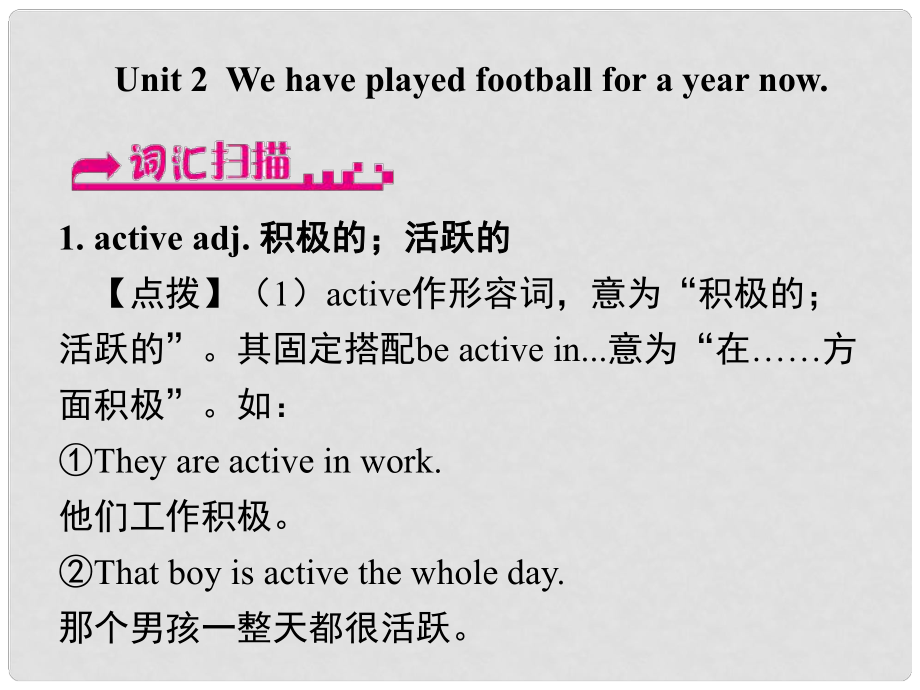《浙江省嘉興市秀洲區(qū)八年級英語下冊 Module 4 Seeing the doctor Unit 2 We have played football for a year now課件 (新版)外研版》由會(huì)員分享�����,可在線閱讀�����,更多相關(guān)《浙江省嘉興市秀洲區(qū)八年級英語下冊 Module 4 Seeing the doctor Unit 2 We have played football for a year now課件 (新版)外研版(20頁珍藏版)》請?jiān)谘b配圖網(wǎng)上搜索���。
1�、Unit 2 We have played football for a year now.1. active adj. 積極的����;活躍的積極的;活躍的【點(diǎn)撥】(1)active作形容詞�����,意為“積極的�����;活躍的”。其固定搭配be active in.意為“在方面積極”��。如:They are active in work. 他們工作積極�����。That boy is active the whole day.那個(gè)男孩一整天都很活躍����。 (2)take an active part in意為“積極參加”���。如: They are always taking an active part in after-sch
2����、ool activities. 他們總是積極參加課外活動(dòng)�。 【延伸】act v. 行動(dòng);activity n. 活動(dòng)���;actively adv. 活躍地���。2. condition n. 狀況��;身體狀況狀況����;身體狀況【點(diǎn)撥】(1)condition作名詞����,意為“(身體)狀況”。固定搭配in condition意為“健康狀況(良)好”�����,其反義詞組為out of condition����,表示“健康狀況不佳”。 (2)in good/bad condition����,表示“處于良好的/糟糕的狀態(tài)”。如: The house is in bad condition. 這幢房子的情況很糟糕�����。 【延伸】conditi
3����、on還可表示“條件���;環(huán)境”,常用復(fù)數(shù)形式��。如: We should improve living conditions for our-selves. 我們應(yīng)該為自己改善生活條件���。 3. sleepy adj. 困的����;想睡的困的����;想睡的 【點(diǎn)撥】sleepy作形容詞�,意為“困的;想睡的”���。如: He felt sleepy and fell asleep soon. 他覺得困并且很快就睡著了����。 【延伸】(1)sleeping意為“熟睡的”��。如: The mother is looking at the sleeping baby in her arms. 母親正看著懷中熟睡的嬰兒。(2)asl
4����、eep意為“睡著的”,常用于短語fall asleep��,意為“入睡”����。如: I was too excited to fall asleep when I heard the news. 當(dāng)我聽到這個(gè)消息時(shí),我興奮地?zé)o法入睡��。4. daily adj. 每天的��;天天的每天的���;天天的 【點(diǎn)撥】daily=everyday����,意為“日常的����;每天的”。如: How is your mothers daily life? 你媽媽的日常生活怎么樣? There are a lot of challenges in our daily lives. 在我們?nèi)粘I钪杏泻芏嗵魬?zhàn)��?!狙由臁縠very day為副
5、詞詞組����,意為“每天”。5. weak adj. 虛弱的���;弱的虛弱的�;弱的【點(diǎn)撥】weak意為“(虛)弱的”����,其反義詞為strong。be weak in.意為“在方面差”�。如: I am weak in maths but good at Chinese. 我數(shù)學(xué)差�,但語文很好。 She is still weak after her illness. 她病后仍然很虛弱��。 【延伸】(1)weakness為weak的名詞形式���,意為“虛弱����;弱勢”。 (2)在某些形容詞前面加定冠詞the�,可表示一類人,如:the weak意為“窮人�;病人;弱者”����。如: We should help the weak
6、. 我們應(yīng)該幫助弱者�����。6. awful adj. 極討厭的�;極壞的極討厭的;極壞的【點(diǎn)撥】awful作形容詞��,意為“極討厭的�;極壞的”。如: It would be awful if he found out the truth. 如果他發(fā)現(xiàn)了真相���,那就糟了����。 I feel awful after eating the apple. 吃了那個(gè)蘋果后,我感覺不舒服�����?�!狙由臁客x詞:terrible adj. 糟糕的�。7. take part (in sth.) 參加;參與(某事)參加�;參與(某事) 【辨析】join, join in與take part in(1)join+sb/組織(club,
7、 army, party等)����,指加入某黨派、團(tuán)體或組織���,成為其中的一員���。(2)join in+n./doing sth.,指參加某項(xiàng)活動(dòng)�。(3)take part in+sports meeting/tree planting/.���, 指參加群眾性的活動(dòng)�����,并在其中起積極作用����。如: Will you join us in playing basketball? 你來和我們一起打籃球嗎?We both joined the Labor Party.我們倆都加入了工黨���。They all join in singing the song.他們一起唱這首歌����。Everyone should take an
8�����、active part in protecting our environment.每個(gè)人都應(yīng)該積極參與到保護(hù)環(huán)境的活動(dòng)中來��。 1. Now I get exercise by taking him for a walk every day. 現(xiàn)在我每天通過遛狗來鍛煉?�,F(xiàn)在我每天通過遛狗來鍛煉�。 【點(diǎn)撥】(1)by doing sth.表示“通過某種方式”,提問時(shí)用how引導(dǎo)的特殊疑問句來提問��。如: You can get some exercise by walking to school. 你可以通過步行去學(xué)校得到一些鍛煉���。 【延伸】by的其他常見用法:(1)表示“乘(交通工具)”���。如:
9�����、We are going to Beijing by train. 我們打算乘火車去北京�。(2)表示“在旁邊”�����。如: He is waiting for us by the door. 他正在門口等我們����。(3)表示“不遲于;在之前”��。如: The sun will rise by six oclock. 太陽將會(huì)在6點(diǎn)之前升起���。 【點(diǎn)撥】(2)take sb./sth. for a walk意為“帶著去散步”����。與walk搭配的相關(guān)短語還有:go for a walk去散步����;have/take a walk散步。如: She often takes the dog for a walk afte
10���、r supper. 她常在晚飯后去遛狗���。 Lets go for a walk after dinner. 晚餐后我們?nèi)ド⑸⒉桨伞?My family like to have/take a walk in the evening. 我的家人都喜歡在晚上散步。 2. Our teacher decided to start a girls football team and I thought, “What a great idea!” 我們的老師決定要組建一支女子足球隊(duì)����,我想:我們的老師決定要組建一支女子足球隊(duì),我想:“這是一個(gè)多么棒的主意?��?��!這是一個(gè)多么棒的主意啊�����!” 【點(diǎn)撥】(1)dec
11���、ide to do sth.意為“決定做某事”�,相當(dāng)于make a decision to do sth.。 (2)a girls football team意為“一支女子足球隊(duì)”�。以-s結(jié)尾的復(fù)數(shù)名詞的所有格,直接在復(fù)數(shù)名詞詞尾加即可����。如: Today is Teachers Day. 今天是教師節(jié)。 【延伸】(1)兩個(gè)或兩個(gè)以上的名詞并列�,表示共同所有時(shí),只需在最后一個(gè)名詞后加s��。如: Tom and Mikes room is very big 湯姆和邁克的房間很大���。(2)兩個(gè)或兩個(gè)以上的名詞并列����,表示分別所有時(shí)�����,需要在每個(gè)名詞后都加s。如: Marys and Jennys bikes
12、 are new. 瑪麗和珍妮的自行車都是新的�����。 3. Perhaps I am too weak to do any exercise 可能是我(身體)太虛弱了不能參加鍛煉可能是我(身體)太虛弱了不能參加鍛煉���。 【點(diǎn)撥】too.to.意為“太而不能”�,其結(jié)構(gòu)看似是肯定句�����,但表達(dá)的卻是否定的意義��。如: He is too shy to speak to his teacher. 他太害羞了�,不敢和他的老師講話�。 【延伸】(1)在too.to.結(jié)構(gòu)中,如果動(dòng)詞有邏輯主語���,主語由介詞for引導(dǎo)����,構(gòu)成“too+形容詞/副詞+for sb. to do sth.”結(jié)構(gòu)�,表示“對某人來說做某事太”。如:
13���、 English is too difficult for me to learn. 英語對我來說太難學(xué)了����。 (2)too.to.可以與so.that.或not.enough to.結(jié)構(gòu)相互轉(zhuǎn)換。與so.that.轉(zhuǎn)換時(shí)�����,that從句要用否定形式�;與not.enough to.轉(zhuǎn)換時(shí),too與not后面的形容詞或副詞構(gòu)成一對反義詞��。如: This box is too heavy for me to carry. =This box is so heavy that I cant carry it. =This box is not light enough for me to carry. 這箱子太重了�����,我搬不動(dòng)����。(3)當(dāng)too.to.前有never, but, not等否定詞時(shí),此結(jié)構(gòu)表示肯定意義�;當(dāng)too后面接glad,happy, early等形容詞或副詞時(shí),此結(jié)構(gòu)也表示肯定意義�����。如: We are too happy to go for a drive. 我們很高興開車去兜風(fēng)�����。 The dress is not too large for you to wear. 這衣服不大,你可以穿��。
 浙江省嘉興市秀洲區(qū)八年級英語下冊 Module 4 Seeing the doctor Unit 2 We have played football for a year now課件 (新版)外研版
浙江省嘉興市秀洲區(qū)八年級英語下冊 Module 4 Seeing the doctor Unit 2 We have played football for a year now課件 (新版)外研版

